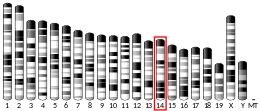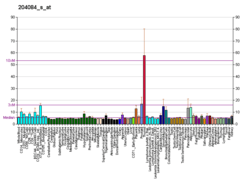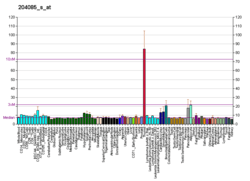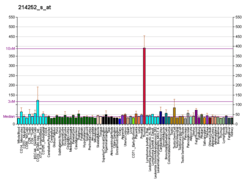CLN5
Ceroid-lipofuscinosis neuronal protein 5 is a protein that in humans is encoded by the CLN5 gene.[5][6][7]
The neuronal ceroid lipofuscinoses (CLN or NCL) are a group of autosomal recessive, progressive encephalopathies in children. They are characterized by psychomotor deterioration, visual failure, and the accumulation of autofluorescent lipopigment in neurons and other cell types. The main childhood forms are the infantile type (Santavuori-Haltia disease; MIM 256730), the late infantile type (Jansky-Bielschowsky disease; MIM 204500), and the juvenile type (Batten disease; MIM 204200) based on the age of onset, clinical course, neurologic and ophthalmologic findings, and ultrastructural analysis (Carpenter et al., 1977 [PubMed 193610]).[supplied by OMIM][7]
References
- GRCh38: Ensembl release 89: ENSG00000102805 - Ensembl, May 2017
- GRCm38: Ensembl release 89: ENSMUSG00000022125 - Ensembl, May 2017
- "Human PubMed Reference:". National Center for Biotechnology Information, U.S. National Library of Medicine.
- "Mouse PubMed Reference:". National Center for Biotechnology Information, U.S. National Library of Medicine.
- Savukoski M, Kestila M, Williams R, Jarvela I, Sharp J, Harris J, Santavuori P, Gardiner M, Peltonen L (Oct 1994). "Defined chromosomal assignment of CLN5 demonstrates that at least four genetic loci are involved in the pathogenesis of human ceroid lipofuscinoses". Am J Hum Genet. 55 (4): 695–701. PMC 1918303. PMID 7942847.
- Klockars T, Savukoski M, Isosomppi J, Laan M, Jarvela I, Petrukhin K, Palotie A, Peltonen L (Sep 1996). "Efficient construction of a physical map by fiber-FISH of the CLN5 region: refined assignment and long-range contig covering the critical region on 13q22". Genomics. 35 (1): 71–8. doi:10.1006/geno.1996.0324. PMID 8661106.
- "Entrez Gene: CLN5 ceroid-lipofuscinosis, neuronal 5".
External links
- GeneReviews/NCBI/NIH/UW entry on Neuronal Ceroid-Lipofuscinoses
- Human CLN5 genome location and CLN5 gene details page in the UCSC Genome Browser.
- Human NCL genome location and NCL gene details page in the UCSC Genome Browser.
Further reading
- Mole SE, Mitchison HM, Munroe PB (1999). "Molecular basis of the neuronal ceroid lipofuscinoses: mutations in CLN1, CLN2, CLN3, and CLN5". Hum. Mutat. 14 (3): 199–215. doi:10.1002/(SICI)1098-1004(1999)14:3<199::AID-HUMU3>3.0.CO;2-A. PMID 10477428.
- Dawson G, Cho S (2000). "Batten's disease: clues to neuronal protein catabolism in lysosomes". J. Neurosci. Res. 60 (2): 133–40. doi:10.1002/(SICI)1097-4547(20000415)60:2<133::AID-JNR1>3.0.CO;2-3. PMID 10740217.
- Vesa J, Peltonen L (2003). "Mutated genes in juvenile and variant late infantile neuronal ceroid lipofuscinoses encode lysosomal proteins". Curr. Mol. Med. 2 (5): 439–44. doi:10.2174/1566524023362311. PMID 12125809.
- Mole SE (2004). "The genetic spectrum of human neuronal ceroid-lipofuscinoses". Brain Pathol. 14 (1): 70–6. doi:10.1111/j.1750-3639.2004.tb00500.x. PMID 14997939.
- Carpenter S, Karpati G, Andermann F, et al. (1977). "The ultrastructural characteristics of the abnormal cytosomes in Batten-Kufs' disease". Brain. 100 Pt 1: 137–56. doi:10.1093/brain/100.1.137. PMID 193610.
- Savukoski M, Klockars T, Holmberg V, et al. (1998). "CLN5, a novel gene encoding a putative transmembrane protein mutated in Finnish variant late infantile neuronal ceroid lipofuscinosis". Nat. Genet. 19 (3): 286–8. doi:10.1038/975. PMID 9662406.
- Heinonen O, Salonen T, Jalanko A, et al. (2000). "CLN-1 and CLN-5, genes for infantile and variant late infantile neuronal ceroid lipofuscinoses, are expressed in the embryonic human brain". J. Comp. Neurol. 426 (3): 406–12. doi:10.1002/1096-9861(20001023)426:3<406::AID-CNE5>3.0.CO;2-5. PMID 10992246.
- Holopainen JM, Saarikoski J, Kinnunen PK, Järvelä I (2001). "Elevated lysosomal pH in neuronal ceroid lipofuscinoses (NCLs)". Eur. J. Biochem. 268 (22): 5851–6. doi:10.1046/j.0014-2956.2001.02530.x. PMID 11722572.
- Isosomppi J, Vesa J, Jalanko A, Peltonen L (2003). "Lysosomal localization of the neuronal ceroid lipofuscinosis CLN5 protein". Hum. Mol. Genet. 11 (8): 885–91. doi:10.1093/hmg/11.8.885. PMID 11971870.
- Vesa J, Chin MH, Oelgeschläger K, et al. (2003). "Neuronal Ceroid Lipofuscinoses Are Connected at Molecular Level: Interaction of CLN5 Protein with CLN2 and CLN3". Mol. Biol. Cell. 13 (7): 2410–20. doi:10.1091/mbc.E02-01-0031. PMC 117323. PMID 12134079.
- Pineda-Trujillo N, Cornejo W, Carrizosa J, et al. (2005). "A CLN5 mutation causing an atypical neuronal ceroid lipofuscinosis of juvenile onset". Neurology. 64 (4): 740–2. doi:10.1212/01.WNL.0000151974.44980.F1. PMID 15728307.
- Bessa C, Teixeira CA, Mangas M, et al. (2006). "Two novel CLN5 mutations in a Portuguese patient with vLINCL: insights into molecular mechanisms of CLN5 deficiency". Mol. Genet. Metab. 89 (3): 245–53. doi:10.1016/j.ymgme.2006.04.010. PMID 16814585.
- Ewing RM, Chu P, Elisma F, et al. (2007). "Large-scale mapping of human protein–protein interactions by mass spectrometry". Mol. Syst. Biol. 3 (1): 89. doi:10.1038/msb4100134. PMC 1847948. PMID 17353931.
- Cannelli N, Nardocci N, Cassandrini D, et al. (2007). "Revelation of a novel CLN5 mutation in early juvenile neuronal ceroid lipofuscinosis". Neuropediatrics. 38 (1): 46–9. doi:10.1055/s-2007-981449. PMID 17607606.






